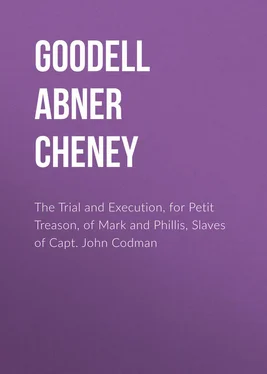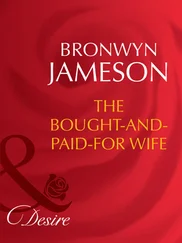Abner Goodell - The Trial and Execution, for Petit Treason, of Mark and Phillis, Slaves of Capt. John Codman
Здесь есть возможность читать онлайн «Abner Goodell - The Trial and Execution, for Petit Treason, of Mark and Phillis, Slaves of Capt. John Codman» — ознакомительный отрывок электронной книги совершенно бесплатно, а после прочтения отрывка купить полную версию. В некоторых случаях можно слушать аудио, скачать через торрент в формате fb2 и присутствует краткое содержание. Жанр: foreign_antique, foreign_prose, на английском языке. Описание произведения, (предисловие) а так же отзывы посетителей доступны на портале библиотеки ЛибКат.
- Название:The Trial and Execution, for Petit Treason, of Mark and Phillis, Slaves of Capt. John Codman
- Автор:
- Жанр:
- Год:неизвестен
- ISBN:нет данных
- Рейтинг книги:5 / 5. Голосов: 1
-
Избранное:Добавить в избранное
- Отзывы:
-
Ваша оценка:
- 100
- 1
- 2
- 3
- 4
- 5
The Trial and Execution, for Petit Treason, of Mark and Phillis, Slaves of Capt. John Codman: краткое содержание, описание и аннотация
Предлагаем к чтению аннотацию, описание, краткое содержание или предисловие (зависит от того, что написал сам автор книги «The Trial and Execution, for Petit Treason, of Mark and Phillis, Slaves of Capt. John Codman»). Если вы не нашли необходимую информацию о книге — напишите в комментариях, мы постараемся отыскать её.
The Trial and Execution, for Petit Treason, of Mark and Phillis, Slaves of Capt. John Codman — читать онлайн ознакомительный отрывок
Ниже представлен текст книги, разбитый по страницам. Система сохранения места последней прочитанной страницы, позволяет с удобством читать онлайн бесплатно книгу «The Trial and Execution, for Petit Treason, of Mark and Phillis, Slaves of Capt. John Codman», без необходимости каждый раз заново искать на чём Вы остановились. Поставьте закладку, и сможете в любой момент перейти на страницу, на которой закончили чтение.
Интервал:
Закладка:
Abner Cheney Goodell
The Trial and Execution, for Petit Treason, of Mark and Phillis, Slaves of Capt. John Codman / Who Murdered Their Master at Charlestown, Mass., in 1755; for Which the Man Was Hanged and Gibbeted, and the Woman Was Burned to Death. Including, Also, Some Account of Other Punishments by Burning in Massachusetts
THE TRIAL AND EXECUTION
OF
MARK AND PHILLIS,
In 1755
[The following pages are, with slight changes, a reprint from the Proceedings of the Massachusetts Historical Society, of a paper read before that Society, March 8, 1883, in answer to a question propounded at a previous meeting, relative to the authenticity of the tradition that a woman was burned to death in Massachusetts in the year 1755. As this case is the only known instance of the infliction of the common-law penalty for petit treason, in New England, and is not known to have been elsewhere reported, the printers have, at the author's request, struck off, in pamphlet form, a limited number of impressions for the use of persons interested in the history of our criminal jurisprudence, who may not have convenient access to the serial from which it is taken, or who may desire to preserve it separately.]
It is not surprising that the execution of a woman, by burning, so lately as when Shirley was governor, – a period when the province had greatly advanced in culture and refinement, – should seem to any one incredible. Indeed, even so critical and thorough a student of our provincial history as our late distinguished associate, Dr. Palfrey, once wrote to me inquiring if the rumor of such a proceeding had any foundation in fact, and if so, whether the execution took place according to law, or by the impulse of an infuriated mob. It gave me great satisfaction to be able to settle his doubts on this subject by referring him to the records of the Superior Court of Judicature, where the judgment, from which I shall presently read to you, and a copy of which I sent to him, appears at length.
The subject is important at this day only as serving to define the nature of the "cruel and unusual punishments" prohibited by the thirty-first article of the Declaration of Rights, in our state Constitution, since this mode of punishment, having continued after the adoption of the Constitution, cannot have been considered by the framers of that instrument either as "cruel" or "unusual" in the sense in which they used these words.
The particulars of the crime for which the malefactors, Mark and Phillis, were executed are briefly as follows: Captain John Codman, a thrifty saddler, sea-captain, and merchant, of Charlestown, was the owner of several slaves whom he employed either as mechanics, common laborers, or house servants. Three of the most trusted of these, Mark, Phillis, and Phebe, – particularly Mark, – found the rigid discipline of their master unendurable, and, after setting fire to his workshop some six years before, hoping by the destruction of this building to so embarrass him that he would be obliged to sell them, they, in the year 1755, conspired to gain their end by poisoning him to death.
In this confederacy some five or six negroes belonging to other owners were more or less directly implicated. Mark, the leader, was able to read, and signed his examination, hereafter referred to, in a bold, legible hand. He professed to have read the Bible through, in order to find if, in any way, his master could be killed without inducing guilt, and had come to the conclusion that according to Scripture no sin would be committed if the act could be accomplished without bloodshed. It seems, moreover, to have been commonly believed by the negroes that a Mr. Salmon had been poisoned to death by one of his slaves, without discovery of the crime. So, application was made by Mark, first to Kerr, the servant of Dr. John Gibbons, and then to Robin, the servant of Dr. Wm. Clarke, at the North End of Boston, for poison from their masters' apothecary stores, which was to be administered by the two women.
Essex, the servant of Thomas Powers, had also furnished Mark with a quantity of "black lead" for the same purpose. This was, unquestionably, not the harmless plumbago to which that name is now usually given, but galena, or plumbum nigrum , a native sulphuret of lead, probably used for a glaze by the potters of Charlestown.
Kerr declined to have any hand in the business; but Robin twice obtained and delivered to Mark a quantity of arsenic, of which the women, Phebe and Phillis, made a solution which they kept secreted in a vial, and from time to time mixed with the water-gruel and sago which they sometimes gave directly to their victim to eat, and at other times prepared to be innocently administered to him by one of his daughters. They also mixed with his food some of the "black lead," which Phillis seems to have thought was the efficient poison, though it appeared from the testimony that he was killed by the arsenic.
The crime was promptly traced home to the conspirators; and on the second day of July, the day after Captain Codman's death, a coroner's jury found that he died from poison feloniously procured and administered by Mark. Ten days later, Quaco, – the nominal husband of Phebe, and one of the negroes implicated, – who was the servant of Mr. James Dalton, of Boston, was examined before William Stoddard, a justice of the peace, and on the same day Robin was arrested and committed to jail. The examination of Quaco was followed by the examination of Mark, and of Phillis, later in the month. These last were taken before the Attorney-General and Mr. Thaddeus Mason.
At the term of the "Superiour Court of Judicature, Court of Assize, and General Goal Delivery," held at Cambridge on the second Tuesday of August following, the grand jury found a true bill for petit treason against Phillis, and against Mark and Robin as accessories before the fact. As this is the only indictment for this offence known to have been found in Massachusetts, and was drawn by that eminent lawyer, Edmund Trowbridge, then Attorney-General, it is worthy of being preserved in print, in connection with the coroner's verdict and the examinations of the suspected parties, which are as follows: —
[Coroner’s Inquest.]
[Two-penny stamp.] Middlesex ss.
An Inquisition Indented, Taken at Charlestown Within the County of Middlesex Aforesaid the Second day of July in the Twenty ninth year of the Reign of our Lord George the Second by the Grace of God, of Great Britain France and Ireland, King Defender of the Faith &c., before John Remington Gentleman one of the Coroners of our said Lord the King, Within the County of Middlesex Aforesaid; upon view of the Body of John Codman of Charlestown Aforesaid Gentleman then and there Being dead by the oaths of Josiah Whitemore, Samuel Larkin, Samuel Larkin Junr. Richard Deavens, William Thompson, Nathaniel Brown, Samuel Kettle, John Larkin, Thomas Larkin, David Cheever, Barnabas Davis, Edward Goodwin, Benjamin Brazier, Samuel Sprague, Richard Phillips, Samuel Hendley and Michael Brigden Good and Lawfull men of Charlestown Aforesaid Within the County Aforesaid; Who being Charg'd and Sworn to Inquire for our said Lord the King, When, and by What means, and how the Said John Codman Came to his Death – upon their Oaths do Say that the said John Codman Came to his death By Poison Procured by his negro man servant Mark Which he took and Languishd untill the first of July Current and then died and so the Jurors Aforesaid upon their oaths do Say, that Aforesaid Mark in manner and Form Aforesaid, the Aforesaid John Codman then and there feloniously did Poison against the peace of our Soverign Lord the King his Crown and Dignity —
In Witness, Whereof, as Well I the Coroner Aforesaid, as the Jurors Aforesaid, to this Inquisition have Interchangeably put our hands and Seals, the day And year Abovesaid.
Читать дальшеИнтервал:
Закладка:
Похожие книги на «The Trial and Execution, for Petit Treason, of Mark and Phillis, Slaves of Capt. John Codman»
Представляем Вашему вниманию похожие книги на «The Trial and Execution, for Petit Treason, of Mark and Phillis, Slaves of Capt. John Codman» списком для выбора. Мы отобрали схожую по названию и смыслу литературу в надежде предоставить читателям больше вариантов отыскать новые, интересные, ещё непрочитанные произведения.
Обсуждение, отзывы о книге «The Trial and Execution, for Petit Treason, of Mark and Phillis, Slaves of Capt. John Codman» и просто собственные мнения читателей. Оставьте ваши комментарии, напишите, что Вы думаете о произведении, его смысле или главных героях. Укажите что конкретно понравилось, а что нет, и почему Вы так считаете.












